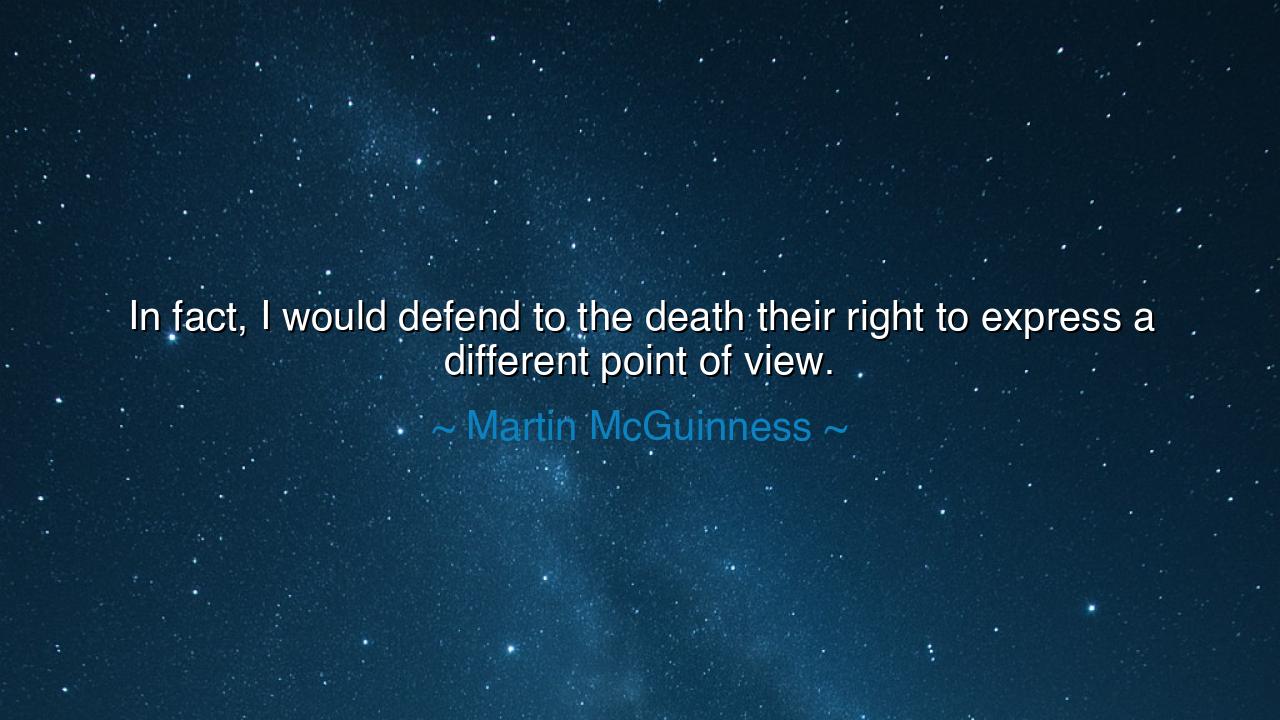
In fact, I would defend to the death their right to express a






The Irish statesman Martin McGuinness, once a figure of conflict and later a voice of peace, declared: “In fact, I would defend to the death their right to express a different point of view.” These words rise from the depths of human struggle and redemption. They are not the polished phrase of a scholar safe in comfort, but the vow of a man who walked through the fire of division, bloodshed, and reconciliation. In his declaration, McGuinness reminds the world that freedom of expression is not merely a political ideal — it is the heartbeat of a truly civilized people. To defend another’s right to speak, even when their words oppose your own, is to show the highest form of courage, humility, and moral strength.
Throughout the long history of humankind, there has always been a tension between power and voice, between those who rule and those who dare to speak truth against them. McGuinness’s words echo the timeless wisdom of the ancients who understood that a society’s greatness lies not in the silence of its citizens, but in the freedom of its discourse. In ancient Athens, the cradle of democracy, even those accused of impiety — like Socrates — were given the chance to speak in their own defense. Though he drank the hemlock rather than renounce his principles, his death became a beacon for all who cherish the right to thought and speech. McGuinness’s statement is born from the same lineage — that freedom must be defended even for one’s adversary, lest tyranny consume all.
The power of McGuinness’s words gains greater meaning when viewed through the lens of his own life. Born in Derry, Northern Ireland, he grew up amid the turmoil of the Troubles, a time when his homeland was torn apart by violence, fear, and mistrust. As a young man, he was drawn into armed struggle, believing it was the only path to justice for his people. Yet as the years passed, he transformed — not by surrendering his convictions, but by deepening them. Through dialogue and empathy, he came to see that peace could not be built on silence or suppression, but on the recognition of every human voice, even those he once called enemies. It was this transformation — from warrior to peacemaker — that gave his words their immortal weight.
When McGuinness said he would “defend to the death” the right of others to speak, he was speaking not as a theoretician, but as one who knew the cost of division. He had seen what happens when people cease to listen to one another — when argument turns to hatred, and hatred turns to war. His statement is both confession and revelation: the realization that true freedom is not achieved by victory over others, but by the acceptance of difference. In those few words lies the heart of democracy itself — not the shallow democracy of slogans and elections, but the deeper, spiritual democracy that honors the sacredness of every conscience.
The origin of this quote may trace back to the Enlightenment spirit that inspired it. It echoes the sentiment often attributed to Voltaire, the great French thinker, who was said to have declared: “I disapprove of what you say, but I will defend to the death your right to say it.” Whether McGuinness consciously drew from that legacy or arrived at it through his own transformation, the resonance is the same: it is the creed of those who have transcended bitterness, who understand that a free society must protect even the voices that offend, for without them, freedom itself withers. His words reveal the nobility of a mind that has made peace with conflict — one that values truth above triumph.
History is filled with those who have embodied this same principle in moments of peril. Mahatma Gandhi defended the right of his opponents to speak, even while they sought to silence him. Nelson Mandela, after decades in prison, emerged not with vengeance, but with forgiveness, insisting that the oppressor too must have a place in the new South Africa. These men, like McGuinness, understood that freedom without compassion becomes cruelty, and that to truly defend liberty, one must also defend the dignity of one’s adversary. Such wisdom is not born in comfort — it is forged in suffering, where the human heart learns that hatred cannot heal what it has wounded.
The lesson, then, is this: honor the voice of the other. Do not silence those who disagree, for in their difference lies the test of your own integrity. It is easy to defend speech that flatters or agrees; it is divine to defend speech that challenges and provokes. To live by McGuinness’s creed is to rise above tribalism and fear — to build bridges where walls once stood. In the family, in the nation, in the world, let this principle guide your conduct: protect the right to speak, for in doing so, you protect the soul of freedom itself.
Thus, Martin McGuinness’s words stand as a torch for all generations — a reminder that the measure of a just society is not how it treats those who conform, but how it safeguards those who dissent. To “defend to the death” another’s right to expression is to affirm the sanctity of human thought itself. It is to say that truth does not fear contradiction, and that love of liberty must always be stronger than the hunger for control. And so, let his words echo through time as both warning and promise: that only by defending the voice of the other do we preserve our own — and only in that defense does the human spirit remain truly free.






AAdministratorAdministrator
Welcome, honored guests. Please leave a comment, we will respond soon